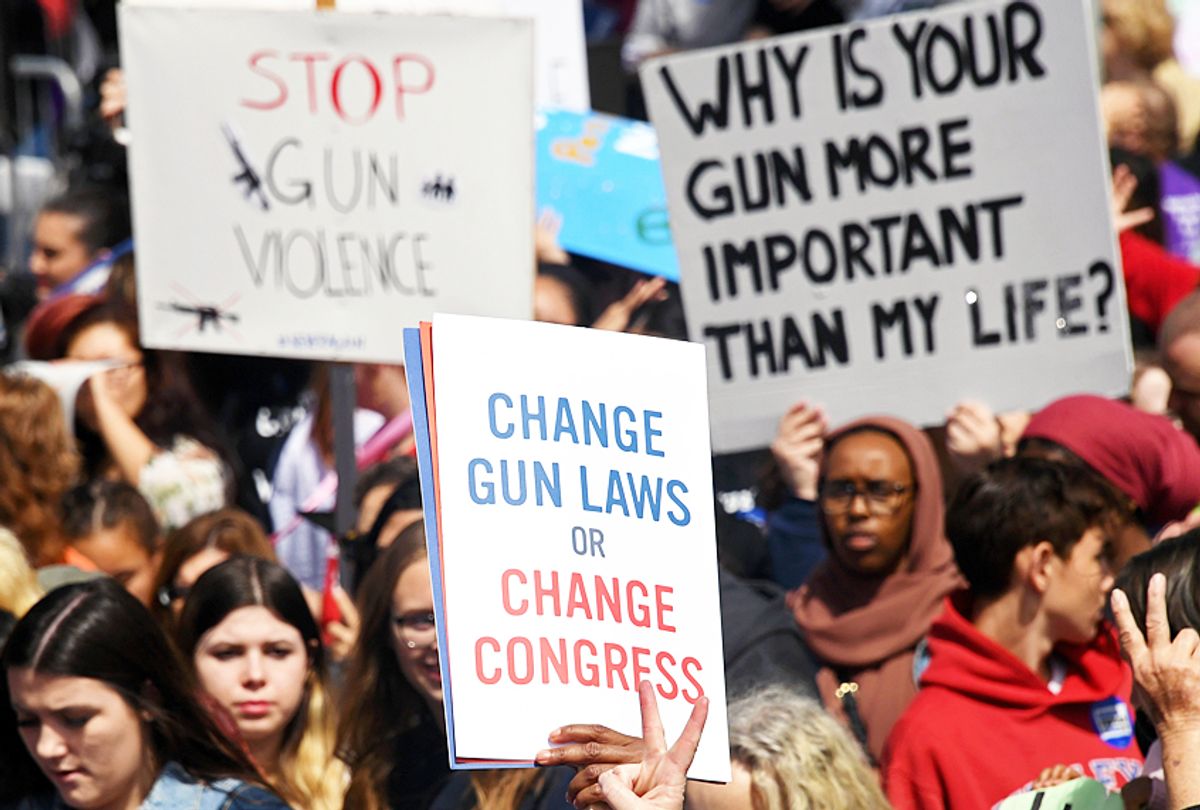I, for one, welcome our new teenage overlords. Over the past six weeks — since the February 14 mass school shooting in Parkland, Florida — the generation born in the 2000s has stepped up in new and extraordinary ways. They've participated in town halls, they've staged walkouts, they've marched and they've presented action plans for positive, sensible change. If, like me, you're lucky enough to have teenagers in your life, the passion and and integrity of these adolescent leaders comes as no great surprise. The only real mystery is how the generation that was literally called "slacker" managed to become the parents of these badasses.
The prevailing image of my Gen-X peers is of mumbly, flannel-wearing whatevers. Our cultural influence appears limited to Smashing Pumpkins and the anguished early seasons of "The Real World." We associate boomers with student protest. We associate millennials with innovation. We associate our own youth with zines and Chanel Vamp. And then we look at our own kids and are dazzled at how motivated they are in their energy and their ability to mobilize.
If this were a New York Times hot take, this would be the point we would infer here that we're reaping the benefits of helicopter parenting. That those elite, well-educated moms who declared themselves the "opt-out" trailblazers and immersed their offspring in enrichment! nothing but enrichment! are now to be congratulated for raising articulate and strategic thinkers. Yet we know, thankfully, that the revolution is not centered in Park Slope.
So how did this happen? Is it just possible that we — sandwiched between our showier, more populous boomer and millennial siblings — and our children — who have been dismissed from an early age as zombies who can't untether themselves from their glowing bricks — are in fact not so bad after all?
To write off my small generation as historically negligible is to see only its most privileged side. It forgets the global student activism that fought so hard in Beijing and made history in Berlin and Prague. It ignores the students of the anti apartheid movement or the transformational work of youth for LGBTQ rights and AIDS activism in the frustrating early years of the public health crisis. It glosses over the feminism and civil rights and disability rights battles being waged even while "Friends" was on the air. I don't claim my peers and I personally achieved very much when we were young, but I have massive respect for the unbroken tradition of student leadership, a tradition that has never been dormant.
Yet I know our own kids want to do far more, and better. And they've got the numbers to make it happen— they already represent roughly a quarter of the population. They have been raised on Harry Potter and Katniss Everdeen, on "Divergent" and "The Maze Runner." They are well-versed in tales of teenagers subverting the dominant paradigm. They've been preparing their whole lives to do it. If my generation did anything at all right, ever, my God, let it be putting books in our children's hands.
On Saturday, March 24, hundreds of thousands of demonstrators around the world showed up to demand gun law reform, and to register to vote. The marches were led and largely headlined by young people — including Parkland survivor Samantha Fuentes, who started her speech, vomited and then got right back to it, which is as metal as it gets. This new generation, this group of kids that doesn't yet have an identifying label that even sticks, is comprised of the children of private school parents and homeschoolers, of Democrats and Republicans and immigrants. They are the most racially diverse generation in American history, the most openly gender fluid and the least religious. They seem to have greater awareness and self-control around their social media habits, unlike their more iPhone addicted parents.
They understand how to step up and organize. The day after the 2016 election, my daughter's classmates were collaborating with high school students around the city and planning demonstrations. They've been doing it ever since. They're also still just kids — often reckless and rebellious and definitely incapable of picking up their socks. But they are absolutely a force to be reckoned with, and any pundits or politicians whining that they should be quiet and listen to their elders clearly have no idea how revolutions work. These students span economic, racial, social and religious boundaries. They are strong. They are intersectional as hell. They are America. And if you think you've heard a lot of noise from them now, just wait till November.



Shares